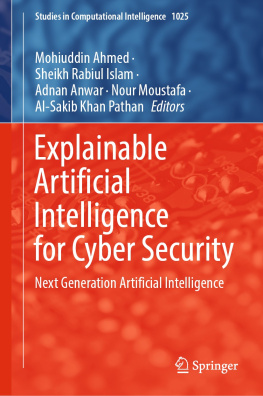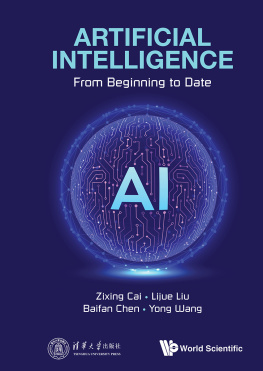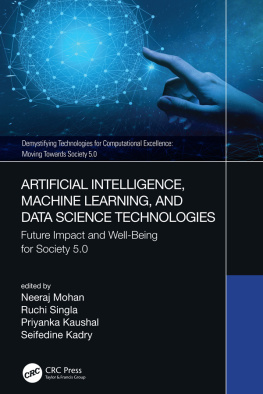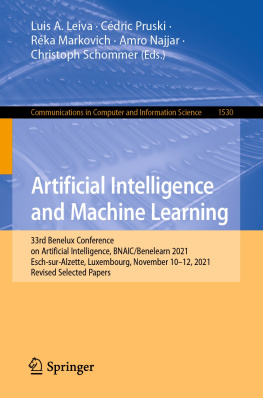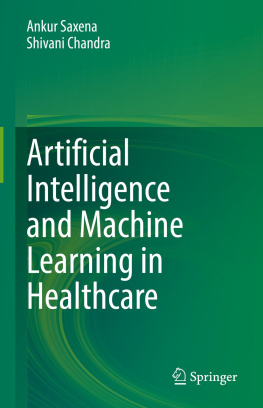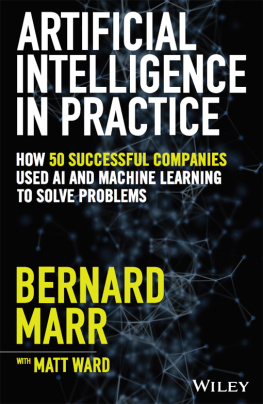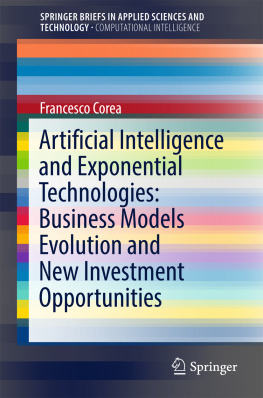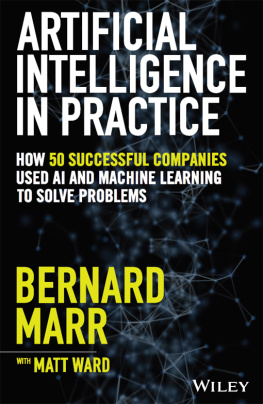Artificial Intelligence: Discover The Role Of Artificial Intelligence In Practice And The Benefits Of AI For Business, Understand Machine Learning And Look Into The Future Of Technology
Nicholas Wilington
Published by Nicholas Wilington, 2020.
While every precaution has been taken in the preparation of this book, the publisher assumes no responsibility for errors or omissions, or for damages resulting from the use of the information contained herein.
ARTIFICIAL INTELLIGENCE: DISCOVER THE ROLE OF ARTIFICIAL INTELLIGENCE IN PRACTICE AND THE BENEFITS OF AI FOR BUSINESS, UNDERSTAND MACHINE LEARNING AND LOOK INTO THE FUTURE OF TECHNOLOGY
First edition. October 9, 2020.
Copyright 2020 Nicholas Wilington.
Written by Nicholas Wilington.
Table of Content
Introduction .................................................................6
History Of Artificial Intelligence ........................9
Expert Systems ..............................................15
Uses Of AI In Our Daily Life ..............................30
Advantages And Disadvantages Of Artificial Intelligence ...................................................41
Ways Artificial Intelligence Is Changing Architecture .................................................49
Follow Steps To Adopt AI In Your Business ....53
How Is AI Impacting Everyday Life? ..................65
Artificial Intelligence Impacting Teaching, Learning, & Education ....................................70
A Three-Level Model Of Action To Analyse Artificial Intelligence And Its Impact ...........................76
Models Of Learning In Data-Based AI ..................92
On Skill & Competence Demand .....................99
Artificial Intelligence And Life In 2030 ..........115
AI Via Domain ...........................................126
Public Safety And Security ...........................173
Prospects And Recommendations For AI Public Policy ......................................................188
Conclusion ................................................211
Introduction

Artificial intelligence is progressing rapidly in our daily life with new advanced innovations day in day out. Computer science systems are designed to perform small instant tasks, facial recognition, self-driving cars, and performance of other minor duties. However, artificial intelligence primarily develops advanced and more complex systems that would outperform humans in whatever way possible. These are including the performance of more complicated tasks like solving problems and playing chess. Therefore, the goal of AI in the future is to perfect all human activities and provide better solutions to problems than humans normally do. An automated system that is capable of doing all the human functions from controlling cars to computerized business systems, in the long term, will pose many different challenges. Moreover, during the prevention of the development of lethal arms that possibly harm humans once they are used to attack. As a result of which the development of super Artificial Intelligence that undergoes self-improvement, triggering an intelligence explosion would leave the human intellectual capacity by far. Super AI development will make history by marking the greatest inventions. Consequently, the invention of highly advanced technologies has significantly supported in war eradication, developing appropriate prevention measures, and proper means of fighting diseases.
Most interestingly, new AI-based advanced technologies would help a lot in fighting against poverty. We have been studying Artificial Intelligence (AI) for decades, and it is still one of the most elusive subjects in Computer Science. And this is partly the reason for how large and nebulous the subject is. Artificial intelligence is ranging from thinkable machines to search algorithms that are used to play board games. Its applications are visible in almost every way computers are used in our society. The development of technology has significantly advanced since the 1990s with added functionalities and a further improvement in every way of life. Early before the 1990s, artificial intelligence was considered as fiction, but since the 1990s, the concept of AI as an area of science is no more considered as a fiction concept. Now, it has become our daily life reality. Machine learning using neural networks mimic the actual processes of the real neurons. Artificial intelligence allows machines to process complex data and provide accurate results and information. With the development and innovations of artificial intelligence marks the golden age. AI is now the most advanced technology widely used in our daily life. Hence, artificial intelligence will dominate the focus of technology for the next decades with improved added functionalities.
Notice that AI has improved the lives of people today, and living with AI is living the best. It should further be noted that AI technology integration has a great connectedness to improve peoples activities in their everyday life.
In this artificially intelligent book, you will get the opportunity to learn and understand everything you need to know about artificial intelligence. From its historical fictional concepts and theory to practice, highlighting its benefits, fall to rise happenings, and how it is impacting our daily life.
History of Artificial Intelligence
Artificial intelligence
John McCarthy in 1956, coined the term Artificial Intelligence during his first academic conference on the subject. Though, the journey of understanding of thinkable machines began much before that. About Vannevar Bushs seminal work, we may think that he proposed such a system that amplifies peoples own understand and knowledge. Alan Turing, after years, wrote a paper on the notion of intelligent machines that are capable of simulating human beings. The computers ability to logic processing cannot be refuted by someone. Still, many dont know and even havent imagined if a machine can think. It is important and even crucial for people to know the precise definition of think because there has been some strong opposition as to whether this notion is even possible or not. A Chinese room argument is the best so-called example of this. The imagination of someone who is locked in a room, where they were passed notes in Chinese using an entire library of rules & look-up tables, and they would be able enough to produce valid responses in Chinese. The question here is that, would they really understand the Chinese language? Based on the argument, since computers would always be applying rote fact lookup, and could never understand a subject.
Many researchers refuted this argument in numerous ways, but it does undermine the faith of people in machines & so-called expert systems in different life-critical applications.
At the AI Dartmouth summer research project, McCarthy organized a workshop in 1956 in which Artificial Intelligence (AI) was officially born and christened as a field. Investigation of ways in which machines could be made to simulate aspects of intelligence was considered as the goal of this projectthe focused and essential idea that continue driving the field forward. In the proposal, McCarthy co-authored for the workshop along with Nathaniel Rochester, Marvin Minsky, and Claude Shannon. The overall credit goes to the team, but McCarthy is well-known for the use of the term Artificial Intelligence and is credited with it. Among the attendants, many people started working and led significant projects under the banner of AI. These great people were passionate about AI, including Arthur Samuel, Selfridge, Oliver, Ray Solomonoff, Herbert Simon, and Allen Newell.


